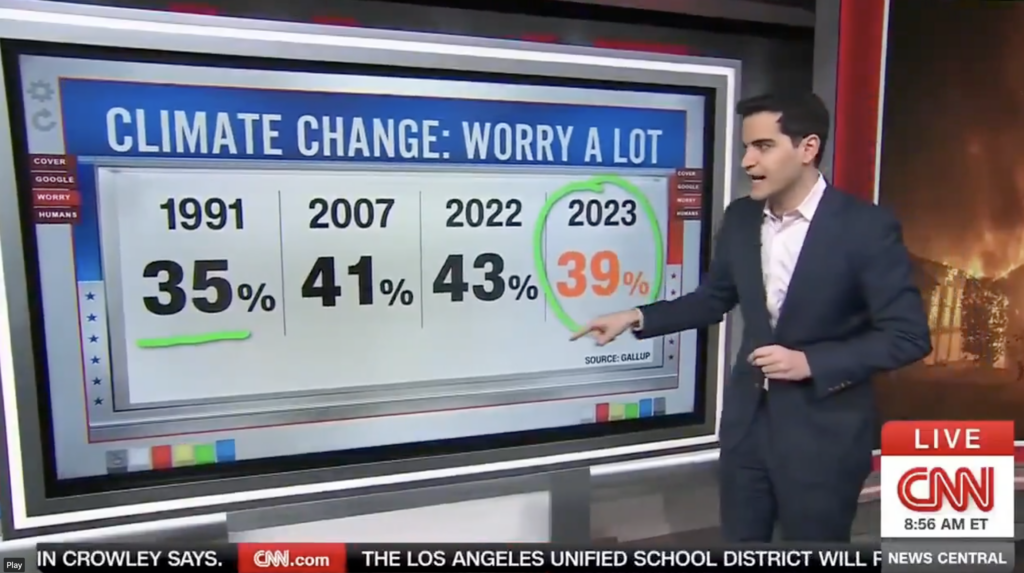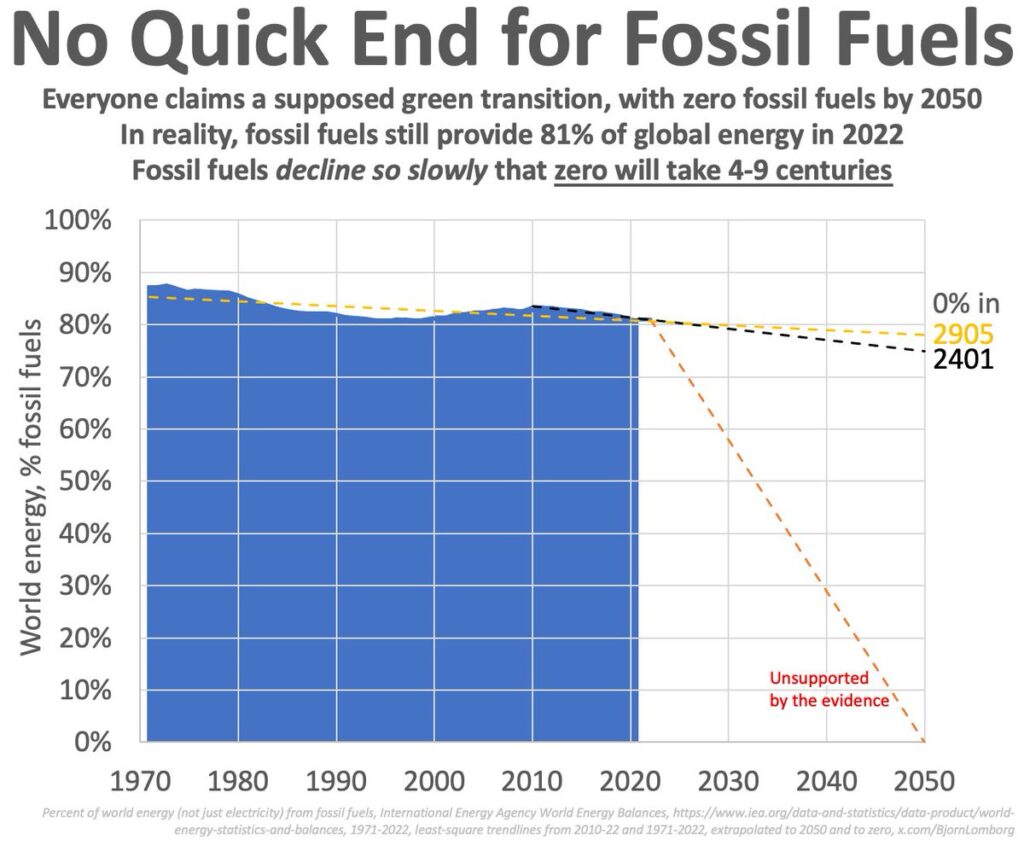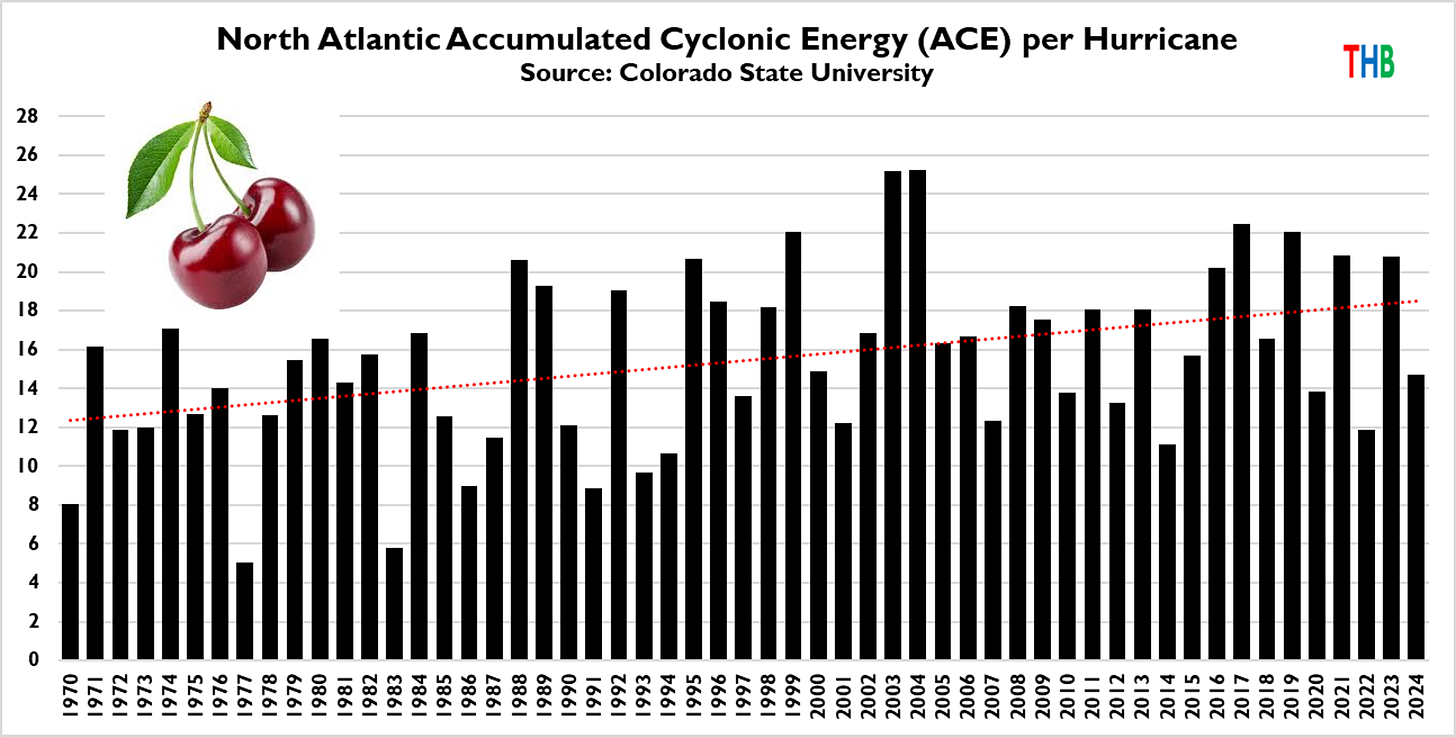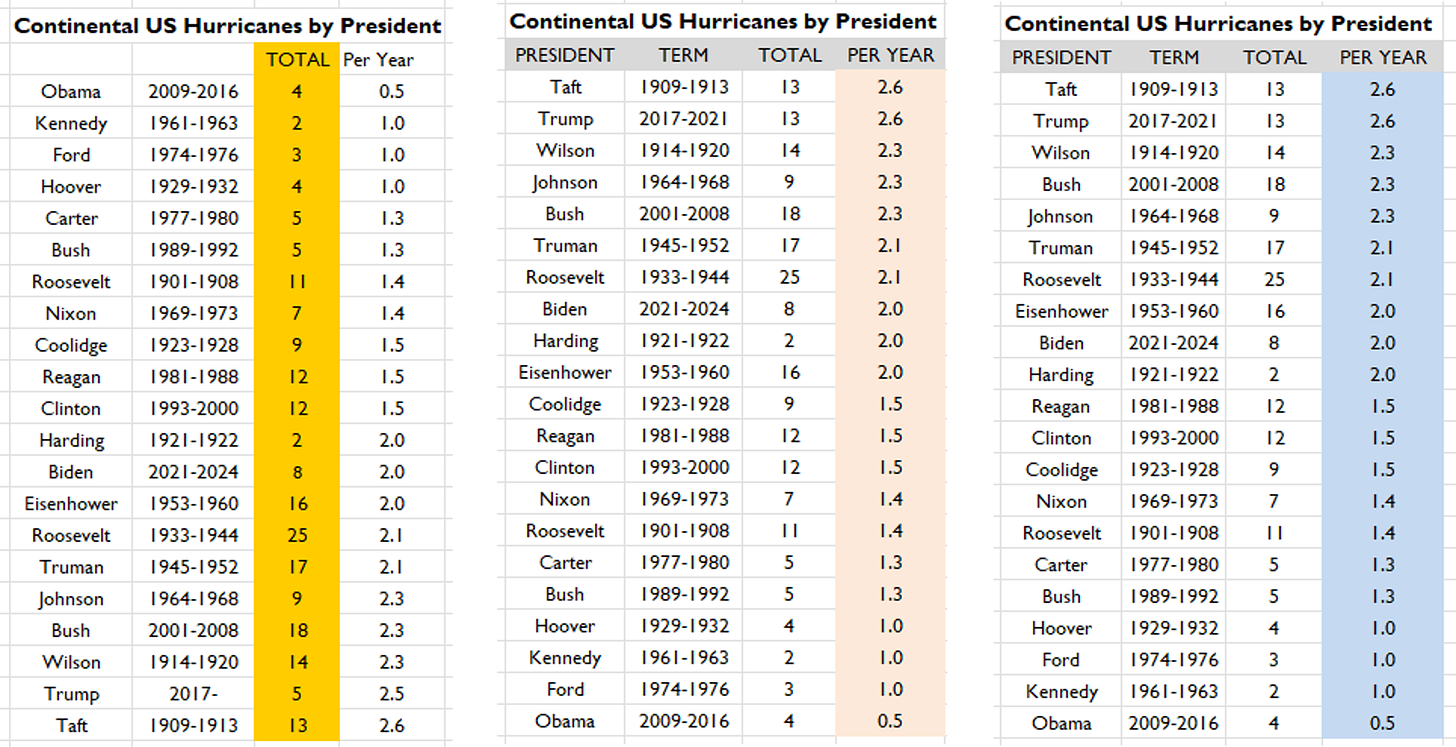CNN analyst: Americans are NOT making connection between climate & wildfires – Polling shows ‘Americans are really no more worried about climate change than they were nearly 35 years ago’


CNN’s Harry Enten: “So despite all these extreme weather events, Americans are really no more worried about climate change than they were now nearly 35 years ago. There is just no real trend line here.”
CNN’s Harry Enten: “2019: 49% – 2020: 49% – 2023: 46% – 2024 45%. That is actually down four points from where we were back in 2019. So LESS than a majority of Americans believe that humans contribute a great deal to climate change.”
‘My 40-year journey with climate change…from idealism to realism’: Former UN IPCC scientist Mike Hulme: ‘I uncritically absorbed the notion that climate change represented the pre-eminent challenge facing humanity’ – Now declares climate is ‘perhaps not the most important thing’

Mike Hulme, Professor at Cambridge University & one of the world’s most accomplished climate scientists. Hulme participated in the UN IPCC second and third assessments & was part of the Climatic Research Unit at the University of East Anglia, where he subsequently founded the Tyndall Centre for Climate Change Research at UEA. He has been at Cambridge University since 2017. … Mike’s publication record is expansive.
Prof. Hulme: “For a long period I uncritically absorbed the notion that climate change represented the pre-eminent challenge facing humanity in the twenty-first century. … I was easily convinced that the growing human influence on the world’s climate would be a reality that all nations would increasingly need to confront, a reality to which their interests would necessarily be subservient and that would be decisive for shaping their development pathways. For more than half of these 40 or so years, it seemed to me self-evident that relations between nations would forcibly be re-shaped by the exigencies of a changing climate.
But now, in the mid-2020s, I can see that I got this the wrong way round. … Too often the language, rhetoric, and campaigning around climate change remains wedded to a world that no longer exists. … Rather than geopolitics having to bend to the realities of a changing climate, the opposite has happened. … In short, this optimism was fueled by the rise of globalism; thinking strategically about climate change was caught-up in this zeitgeist. … Climate is not the only thing that is changing through our lifetimes, and perhaps not the most important thing. …
By 2007, the illusion under which I had been working—that geopolitics would bend to the force of concern over climate change—was already ending. The Kyoto Protocol, signed in 1997, ratified in 2004, had yielded next to nothing in terms of emissions reductions. … And the denouement came in December 2009 at COP15, billed as ‘the most important meeting in human history’. During a few days in a wintery Copenhagen, China’s growing political and economic muscle was firmly exercised, the impotence of the EU’s climate diplomacy revealed, and the limits of late twentieth century internationalism exposed.
The curtain finally came down on Sarewitz’s so-called “plan” during the (northern) 2009/10 winter of climate discontent. In November 2009, the western world was blind-sided by the Climategate controversy over leaked emails between corresponding scientists, and in the early months of 2010 its confidence in climate science further undermined by several challenges to the IPCC’s trust and credibility. …
So this has been my 40-year journey with climate change, initially from idealist to pragmatist, and now from pragmatist to realist. It is not a particularly hopeful story-arc, but then why should I, or anyone else, ever think that climate change was going to offer one?…Climate is not the only thing that is changing through our lifetimes, and perhaps not the most important thing. …
I now see the need for a deeper reading of political realism and power, that goes beyond seeing science as a coercive force that trumps geopolitics, beyond appeals to a superficial cosmopolitanism. To use the language of Jason Maloy at Louisiana University, climate change is neither an emergency or a crisis; it is a political epic, “a process of collective human effort that features gradual progression through time, obscure problem origins, and anticlimactic outcomes.”
The best that we can say is that the world will continue slowly to decarbonize its energy system and, at the same time, the Earth will continue slowly to warm. And societies will continue to adapt to evolving climate hazards in new ways, as they have always done, with winners and losers along the way.
Fed scientist: ‘L.A. Fires Not Climate Change’ – Studies & data show ‘climate’ not linked to California wildfires
Wildfires: US Geological Survey scientist Jon Keeley: ‘L.A. Fires Not The Result Of Climate Change’ – Scrubland plant ‘fires have been around for at least 20 million years. What’s changed is we have people on the landscape’ 2021 Study found: ‘100% of all [Santa Ana] fires are the result of human ignitions, either intentionally or […]
41 wind-threatens-whales articles reveal federal deception
https://www.cfact.org/2024/12/30/my-41-wind-threatens-whales-articles-track-federal-deception/ By David Wojick A New Years’s retrospective. Many of these 41 CFACT articles were sent to key NOAA whale protection people when published over a period of 2.5 years. All have been carefully ignored, an ongoing deception. Trump has promised action. 1. Capping marine mammal harassment constrains offshore wind https://www.cfact.org/2024/12/09/capping-marine-mamma-harassment-constrains-offshore-wind/ 2. The California offshore […]
What rapid transition?! 400-900 years to get to Zero fossil fuels!? – ‘Today, world gets 81% of its energy from fossil fuels’ – ‘On current trends from 2010, we get to zero in 2401’

No, fossil fuels won't end soon Today, world gets 81% of its energy (not just electricity) from fossil fuels, down from 82.8% in 2010 and 81.2% in 2000 On current trends from 2010, we get to zero in 2401, four centuries from now On current trends…https://t.co/rEXBafxUmE pic.twitter.com/kb7hvt5vqG — Bjorn Lomborg (@BjornLomborg) December 26, 2024
Bloomberg News: Big tech data centers, & AI are ‘going to disrupt the green transition’ as utilities ‘rely heavily on natural gas, & even coal’ to ‘have reliable & affordable power’
Bloomberg News: Big tech companies need lots of electricity, for data centers and especially for artificial intelligence. Homes are using more electricity for heating and cooling. Factories need more electricity to shift away from fossil fuels. … That’s really going to disrupt the green transition. Power providers that have made pledges to cut back or eliminate carbon emissions are now starting to reverse course. Duke Energy Corp. plans to extend the life of its largest coal-fired power plant, which would push aside its goal to exit coal by 2035. Duke has said that its resource plans are not final decisions and are revised regularly.
Power providers that have made pledges to cut back or eliminate carbon emissions are now starting to reverse course. … And all of that is before Donald Trump returns to the White House next month. The president-elect is well-known for his support of fossil fuels and his skepticism of climate policies.
An Energy/Climate Christmas ‘Wish List’ for President Trump – Eliminate UN climate pact ‘permanently’
https://www.newsmax.com/finance/streettalk/trump-administration-agenda/2024/12/16/id/1191766/ By Craig Rucker For young tots across the nation, December “Tis the season” to put together a Christmas “wish list” for mom and dad. While no one knows for sure how this tradition began, some suspect it was the Sears and Roebuck Company which was responsible when it began publishing its Christmas Wish Book in […]
Todd Stern’s Climate Lesson for the Trump Admin: A Review of UN Paris Climate Pact: How It Happened, Why It Matters, & What Comes Next
https://www.realclearenergy.org/articles/2024/12/11/sterns_climate_lesson_for_the_trump_administration_1077973.html By Rupert Darwall December 11, 2024 “The 2015 Paris climate should take its place as one of the great triumphs in history,” Jonathan Chait wrote two days after it was concluded. Todd Stern, America’s climate envoy for all but eight months of Barack Obama’s presidency, was indispensable in making the Paris agreement happen. With his new book, Landing […]
Pielke Jr.’s U.S. Hurricane Overview 2024: North Atlantic was active while most of rest of the world saw relatively inactive year – No trend in global hurricanes since 1980

The IPCC actually concluded about trends in tropical cyclones: “There is low confidence in most reported long-term (multidecadal to centennial) trends in TC frequency- or intensity-based metrics . . .” …
MIT’s Kerry Emanuel, who is more bullish on human influences on tropical cyclones than the IPCC or most of his peers, but also recognizes that current understandings are far from black and white:
“At present, there is little scientific consensus about trends in global or regional [tropical cyclone] activity, either in the past, as detected in observations or in climate model simulations, or in the future as our climate continues to change.” …
By all metrics, 2024 was a very active season in historical context — the 12th most active in the past 74 years or about the 85th percentile. The continental U.S. saw five hurricane landfalls — 2 major (Category 3+ = Helene and Milton) and 3 minor (Categories 1 and 2 = Beryl, Debby, and Francine). …
The figures above show long-term trends in continental U.S. hurricane landfalls. The last 8 years have seen a lot of major hurricane landfalls. The 8 years before that saw none. Since 1900 there are no trends in either variable. …
North Atlantic hurricanes have not overall become more intense since 1900.
But what if you really, really want to show alarming, upwards trends? Here is what you do: Using ACE, identify the most inactive period for North Atlantic hurricane activity in the past 125 years. That happens to be the period 1970 to 1979. Then, start a trend analysis in 1970. Voila!

Pro tip: Start analyses of hurricane trends in 1970s to detect upwards trends. Attribute these trends to human causes and watch the publications, citations, media coverage roll in!
…
Continental U.S. Hurricane Landfalls by President

Finally, a bit of fun with some meaningless data. The figure above shows U.S. hurricane landfalls by president. President Biden sits in the middle of the pack with Presidents Harding and Eisenhower. A second term President Trump will have a chance to continue his efforts to best President Taft as the president with the most hurricanes during his term in office. President Obama’s record hurricane inactivity over his two terms is likely to stand for a while — Thanks Obama!
Top 10 Climate & Energy Action Items for Trump in His 2nd Term

Top 10 Climate and Energy Action Items for President Trump in His Second Term By James Taylor, Steven Milloy This list was compiled and presented by The Heartland Institute, E&E Legal Institute, Committee for a Constructive Tomorrow (CFACT), Truth in Energy and Climate, and The American Energy Institute. Get the PDF 1. Paris Climate Treaty and Endangerment […]


